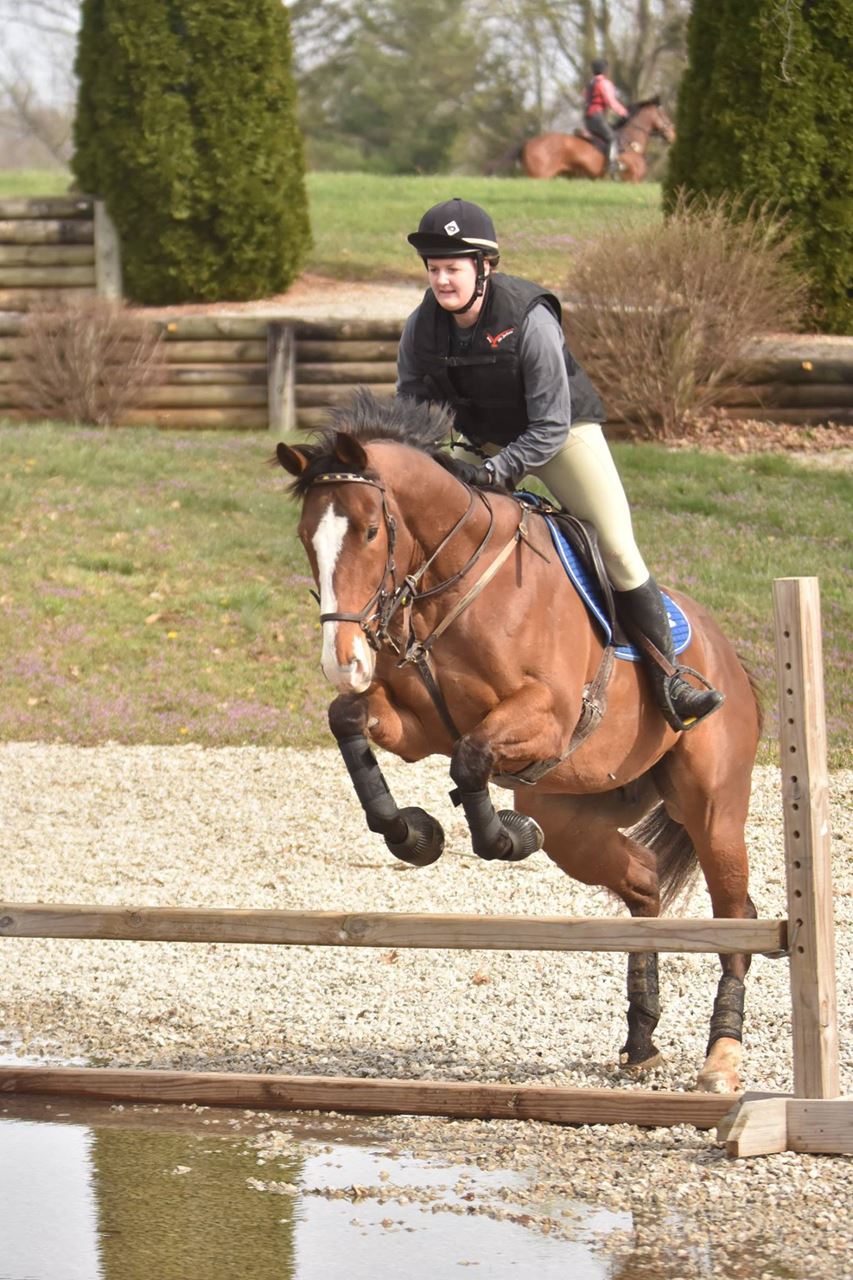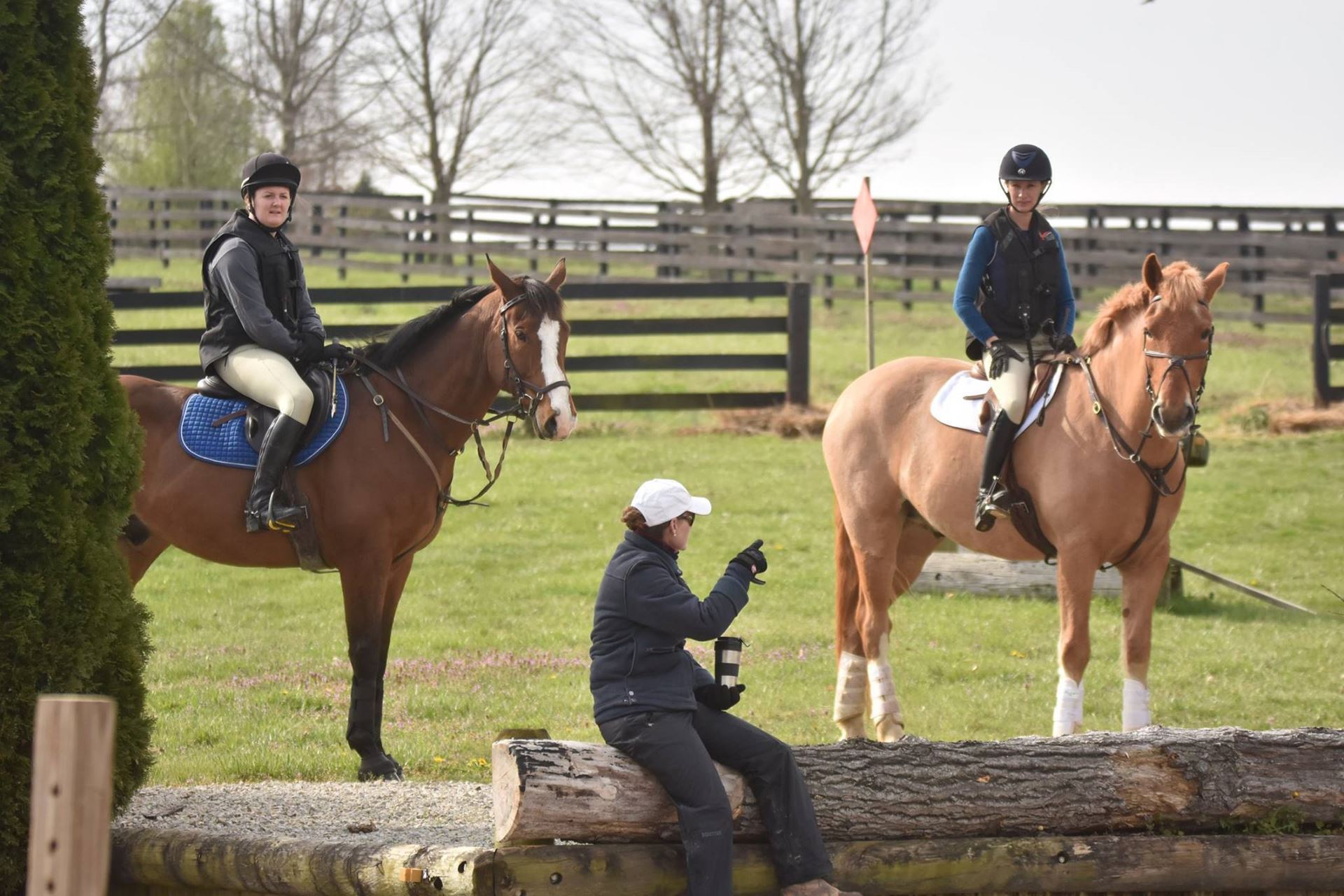Riding in a well-run clinic taught by a profession in your discipline can be an enlightening experience, allowing you a fresh take on your riding.
By Sarah E. Coleman

Ellen Murphy rides in a George Williams clinic.
Photo by Veronica Ferth.
Riding in a clinic can be extremely helpful, allowing you to not only ride under a professional with whom you may not ride regularly, it also offers you the opportunity to watch other riders as well, allowing you to glean information from their lessons and efforts.
If you’re going to spend your time and hard-earned money, you’ll want to do your due diligence to be sure that the clinic you select is the right one for you and your horse. Doing a bit of background checking is helpful: Google the clinician if you’re not overly familiar with him or her. Look at reviews that have been posted and ask friends if they’ve ridden with the instructor before. Watching YouTube videos of clinicians you may like to ride with is a great way to evaluate their teaching style.
Preparation is Key
Just like a horse show, preparation or the clinic is key. Ellen Murphy of Ellen Murphy Sporthorses in Georgetown, KY, plans her week to two weeks leading up to the clinic specifically to ensure her horse is tuned up, comfortable, loose and working well, but not sore or over drilled. “If I have a chiro or my massage therapist due, I schedule that to get the most out of it for the clinic. The key is to know your horse,” she explains. “If I go to a clinic on the weekend then I will do my harder schooling earlier in the week and then maybe a day off, hack day, and then a long-and-low day leading up so my horse is stretched out and fresh.”
Chelsea Smith, owner of two OTTBS and Smith Equine Media, prepares her horses training programs as well. “I take some extra lessons and school cross-country if it’s an eventing clinic,” she explains. “I want my horse to get out and see things before I go so that I make the most of the opportunity!”
As you will have only a limited amount of time to ride with the instructor, you want to ensure that you arrive to the clinic venue on time and ready to ride. If you’re going to a barn or arena you have never been to before, arrive early enough that you can familiarize yourself with the facility layout, and find your way around.
If you can, get your horse in the arena before the clinic or during breaks so you’re not wasting valuable time getting him used to the spooky corners. If you are not the first ride time of the day, watch some of the other riders go, especially if it is a new-to-you clinician—this will help you determine the tone of the clinician and his or her lessons.
Whenever possible, stay and watch the other clinic sessions. “It’s one thing to ride and experience the lesson, but it's so much more helpful when you can watch other people experience it as well,” says Ellen. “They [riders] don't always have the exact same lesson, but it really helps with understanding the clinician’s exercises, objectives, and approach and technique!

Chelsea Smith rides in an MSEDA Kim Severson Clinic.
Photo by JJ Sillman.
Stretching Boundaries
Remember that “a clinic is NOT a regular lesson,” says Ellen. “Your regular instructor builds on things week by week. A clinic is a fresh set of eyes with two to three days to meet an objective. They [the clinicians] are going to push you out of your comfort zone most likely. And that's why you go!”
It’s important to go to a clinic with an open mind. “Just because that isn't how you do it [a movement or technique] at home doesn’t mean it isn't right,” Ellen reminds riders. “You’re there [at the clinic] to push the limits a bit and discover new limits. I see so many people end up upset and crying at clinics, and I think that is because they expect to be told everything is great. But the point of a clinic is to really push you through to that next level. So embrace the suck and learn from it!”
Chelsea seconds that clinics can be a stressful situation for both you and your horse. “Just be patient,” she says. “I also try to treat it like a horse show—I prepare as much as possible at home, and then just try and have fun!”
The key to getting the most from any clinic is to approach everything with an open mind. “Be ready to learn and never assume you know anything,” says Ellen. “And check your ego at the door,” she reminds. You are not at the clinic to show off or engage in a deep discussion on training philosophies with the clinician--at least during your scheduled clinic time.
“Be really open to trying new approaches. Just because you think you have figured out what works well for your horse doesn't mean that the clinician doesn't have an experience with a similar type of horse that is going to allow them to show you a totally different approach, which may be way more effective,” says Ellen. “It might not be effective with this horse at all at this point in time--but that doesn't mean 6 months from now or on the next horse you own that it won't be effective.” What is conveyed at a clinic is meant to help you not only on this horse at this point in time; the knowledge given you should be a tool in your training kit you can use on many horses in the future.

Photo by JJ Sillman
The Takeaway
The end goal of a clinic is not to walk away with the clinician having told you everything is perfect; you should walk away with some added insight into how your horse responds to different training techniques. Be sure to ask the clinician what he or she feels you the next steps for you and your horse should be.
After your ride, sit down and write or type notes to yourself on what exercises you did, what you learned and how your horse reacted. If you get the chance to watch other portions of the clinic, take notes on those as well, including exercise that intrigued you or those you think could benefit your horse.
